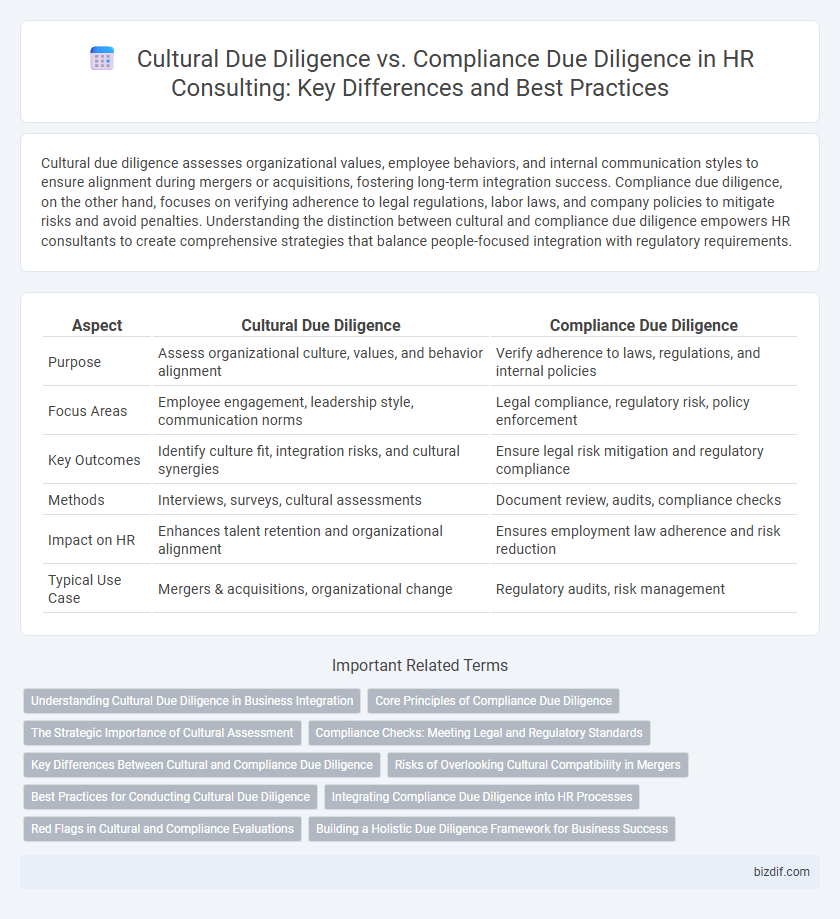Cultural due diligence assesses organizational values, employee behaviors, and internal communication styles to ensure alignment during mergers or acquisitions, fostering long-term integration success. Compliance due diligence, on the other hand, focuses on verifying adherence to legal regulations, labor laws, and company policies to mitigate risks and avoid penalties. Understanding the distinction between cultural and compliance due diligence empowers HR consultants to create comprehensive strategies that balance people-focused integration with regulatory requirements.
Table of Comparison
| Aspect | Cultural Due Diligence | Compliance Due Diligence |
|---|---|---|
| Purpose | Assess organizational culture, values, and behavior alignment | Verify adherence to laws, regulations, and internal policies |
| Focus Areas | Employee engagement, leadership style, communication norms | Legal compliance, regulatory risk, policy enforcement |
| Key Outcomes | Identify culture fit, integration risks, and cultural synergies | Ensure legal risk mitigation and regulatory compliance |
| Methods | Interviews, surveys, cultural assessments | Document review, audits, compliance checks |
| Impact on HR | Enhances talent retention and organizational alignment | Ensures employment law adherence and risk reduction |
| Typical Use Case | Mergers & acquisitions, organizational change | Regulatory audits, risk management |
Understanding Cultural Due Diligence in Business Integration
Cultural Due Diligence in business integration evaluates organizational values, employee behaviors, and communication styles to identify potential cultural clashes that could hinder merger success. This process involves assessing leadership alignment, workforce engagement, and adaptability to foster a cohesive post-merger environment. Unlike Compliance Due Diligence, which focuses on legal and regulatory adherence, Cultural Due Diligence prioritizes human capital integration to enhance overall synergy and performance.
Core Principles of Compliance Due Diligence
Core principles of Compliance Due Diligence in HR consulting emphasize strict adherence to legal and regulatory frameworks, including labor laws, anti-discrimination policies, and workplace safety standards. This process ensures that organizations proactively identify and mitigate compliance risks tied to employment practices, benefits administration, and contractual obligations. Effective Compliance Due Diligence fosters transparency, accountability, and ethical conduct within the workforce, reducing potential legal liabilities and enhancing organizational integrity.
The Strategic Importance of Cultural Assessment
Cultural due diligence assesses organizational values, behaviors, and employee engagement to identify potential cultural clashes that may impact post-merger integration and overall business performance. Unlike compliance due diligence, which focuses on legal and regulatory adherence, cultural assessment provides strategic insights into employee alignment and change management readiness. Integrating cultural due diligence into HR consulting enhances risk mitigation and supports sustainable growth in mergers, acquisitions, and organizational transformations.
Compliance Checks: Meeting Legal and Regulatory Standards
Compliance due diligence in HR consulting rigorously evaluates adherence to labor laws, industry regulations, and internal policies to mitigate legal risks. It involves systematic compliance checks such as verifying employee documentation, wage and hour laws, workplace safety standards, and anti-discrimination policies. Ensuring alignment with legal and regulatory standards protects organizations from penalties and fosters a compliant employment environment.
Key Differences Between Cultural and Compliance Due Diligence
Cultural Due Diligence assesses the alignment of organizational values, work environment, and employee behaviors to ensure smooth integration during mergers or acquisitions. Compliance Due Diligence focuses on evaluating adherence to legal regulations, labor laws, and company policies to mitigate regulatory risks. The key difference lies in Cultural Due Diligence emphasizing human and behavioral factors, whereas Compliance Due Diligence centers on legal and regulatory compliance.
Risks of Overlooking Cultural Compatibility in Mergers
Overlooking cultural compatibility during mergers can lead to significant risks such as employee disengagement, increased turnover, and reduced productivity, which compliance due diligence alone may not detect. Cultural due diligence assesses organizational values, communication styles, and leadership alignment to identify potential clashes that could disrupt integration efforts. Neglecting these cultural factors often results in failed integrations, undermining the expected financial and operational synergies.
Best Practices for Conducting Cultural Due Diligence
Conducting Cultural Due Diligence involves assessing organizational values, employee behaviors, and leadership styles to ensure alignment in mergers and acquisitions, contrasting with Compliance Due Diligence's focus on legal and regulatory adherence. Best practices include using qualitative interviews, employee surveys, and ethnographic research to uncover cultural risks and synergies. Integrating cultural assessments early in the due diligence process facilitates smoother integration and enhances long-term organizational performance.
Integrating Compliance Due Diligence into HR Processes
Integrating compliance due diligence into HR processes ensures adherence to labor laws, regulatory standards, and organizational policies, minimizing legal risks and promoting ethical workplace practices. This involves thorough verification of employee credentials, monitoring of contract obligations, and continuous auditing of HR policies to maintain compliance with evolving legal frameworks. Effective integration enhances transparency, supports risk management, and aligns HR operations with corporate governance requirements.
Red Flags in Cultural and Compliance Evaluations
Cultural due diligence identifies red flags such as misaligned values, poor communication norms, and resistance to diversity, which can undermine integration and employee engagement. Compliance due diligence highlights risks like violations of labor laws, inadequate regulatory adherence, and gaps in ethical policies that may lead to legal penalties or reputational damage. Effective HR consulting integrates these evaluations to mitigate risks and foster a harmonious, compliant organizational environment.
Building a Holistic Due Diligence Framework for Business Success
Cultural due diligence evaluates organizational values, employee behaviors, and leadership styles to identify potential integration challenges and alignments during mergers or acquisitions, while compliance due diligence focuses on assessing adherence to legal and regulatory requirements to mitigate risks. Integrating both approaches creates a holistic due diligence framework that addresses both the human and legal dimensions of business transactions. This comprehensive strategy enhances decision-making, fosters smoother integrations, and supports long-term business success by balancing cultural compatibility with regulatory compliance.
Cultural Due Diligence vs Compliance Due Diligence Infographic

 bizdif.com
bizdif.com